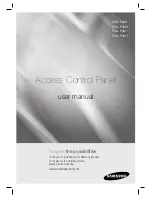
39.6.2.6. Management of SETUP Transactions
When a SETUP token is detected and the device address of the token packet does not match
DADD.DADD, the packet is discarded and the USB module returns to idle and waits for the next token
packet.
When the address matches, the USB module checks if the endpoint is enabled in EPCFG. If the
addressed endpoint is disabled, the packet is discarded and the USB module returns to idle and waits for
the next token packet.
When the endpoint is enabled, the USB module then checks on the EPCFG of the addressed endpoint. If
the EPCFG.EPTYPE0 is not set to control, the USB module returns to idle and waits for the next token
packet.
When the EPCFG.EPTYPE0 matches, the USB module then fetches the Data Buffer Address (ADDR)
from the addressed endpoint's descriptor and waits for a DATA0 packet. If a PID error or any other PID
than DATA0 is detected, the USB module returns to idle and waits for the next token packet.
When the data PID matches and if the Received Setup Complete interrupt bit in the Device Endpoint
Interrupt Flag register (EPINTFLAG.RXSTP) is equal to zero, ignoring the Bank 0 Ready bit in the Device
Endpoint Status register (EPSTATUS.BK0RDY), the incoming data is written to the data buffer pointed to
by the Data Buffer Address (ADDR). If the number of received data bytes exceeds the endpoint's
maximum data payload size as specified by the PCKSIZE.SIZE, the remainders of the received data
bytes are discarded. The packet will still be checked for bit-stuff and CRC errors. Software must never
report a endpoint size to the host that is greater than the value configured in PCKSIZE.SIZE. If a bit-stuff
or CRC error is detected in the packet, the USB module returns to idle and waits for the next token
packet.
If data is successfully received, an ACK handshake is returned to the host, and the number of received
data bytes, excluding the CRC, is written to the Byte Count (PCKSIZE.BYTE_COUNT). If the number of
received data bytes is the maximum data payload specified by PCKSIZE.SIZE, no CRC data is written to
the data buffer. If the number of received data bytes is the maximum data payload specified by
PCKSIZE.SIZE minus one, only the first CRC data is written to the data buffer. If the number of received
data is equal or less than the data payload specified by PCKSIZE.SIZE minus two, both CRC data bytes
are written to the data buffer.
Finally the EPSTATUS is updated. Data Toggle OUT bit (EPSTATUS.DTGLOUT), the Data Toggle IN bit
(EPSTATUS.DTGLIN), the current bank bit (EPSTATUS.CURRBK) and the Bank Ready 0 bit
(EPSTATUS.BK0RDY) are set. Bank Ready 1 bit (EPSTATUS.BK1RDY) and the Stall Bank 0/1 bit
(EPSTATUS.STALLQR0/1) are cleared on receiving the SETUP request. The RXSTP bit is set and
triggers an interrupt if the Received Setup Interrupt Enable bit is set in Endpoint Interrupt Enable Set/
Clear register (EPINTENSET/CLR.RXSTP).
39.6.2.7. Management of OUT Transactions
When an OUT token is detected, and the device address of the token packet does not match
DADD.DADD, the packet is discarded and the USB module returns to idle and waits for the next token
packet.
If the address matches, the USB module checks if the endpoint number received is enabled in the
EPCFG of the addressed endpoint. If the addressed endpoint is disabled, the packet is discarded and the
USB module returns to idle and waits for the next token packet.
When the endpoint is enabled, the USB module then checks the Endpoint Configuration register
(EPCFG) of the addressed output endpoint. If the type of the endpoint (EPCFG.EPTYPE0) is not set to
OUT, the USB module returns to idle and waits for the next token packet.
Atmel SAM L22G / L22J / L22N [DATASHEET]
Atmel-42402E-SAM L22G / L22J / L22N_Datasheet_Complete-07/2016
924
















































